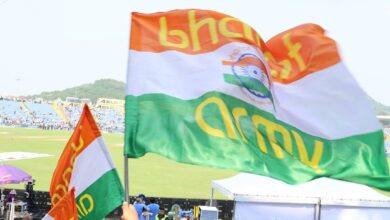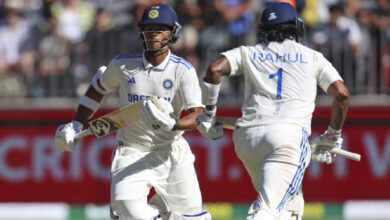Meet Pratima Barwa, the hockey coach behind Simdega’s hockey fairytale | Hockey News

Sangita Kumari welled up when she learnt that, on one of the most memorable nights of her career, her mentor had been watching from the stands.The young hockey forward was oblivious to the fact when, last month, India produced a near-perfect performance to beat South Korea 5-0 in the Asian Champions Trophy in Ranchi. Leading the demolition were a couple of homegrown talents, including Sangita. And cheering for them was a coach who had polished these rough diamonds.
“Oh I didn’t know she came today,” Sangita had said, choking up a bit as she spoke. “It feels really good to hear that she watched us. I am feeling very proud!”
The mentor is Pratima Barwa, who has been training young female hockey players at the Jharkhand government-run hockey centre in Simdega, a remote rural area 135 km southwest of Ranchi.
The 44-year-old had travelled for the tournament towards the back end for a chance to see years of hard work in fruition with her own eyes. Pratima was beaming with pride as India’s first goal on the night came from a brilliant combination down the left flank as Sangita fed another Simdega product, Salima Tete, for a goal. “It is what I dream of,” she said at that moment.
School in Simdega in the background of the astroturf that was laid in 2015 and the sports hostel (R) where Pratima coaches her students. (Express Photo Vinayakk Mohanarangan)
Pratima, who hails from Khunti, used to play for Bihar in the early 90s but a left knee ligament injury in 1995 didn’t allow her to progress to the international level even as a couple of her batchmates managed to.
She then made a promise to herself that she would help young players get there. “I yearned to become an international player but couldn’t. However, there was a burning desire within me to produce top-level players; that the players I train play for India so that my dream gets fulfilled through them.”
The epitome of joy was when her centre finally produced an Olympian in Salima Tete, who has become an integral part of the Indian midfield in recent years. In Sangita, there is a bright hope for the future too. And in Beauty Dungdung there is another young forward waiting in the wings, hoping to recover from an injury to make her mark.
Beauty considers Pratima to be her ‘second mother’.
“From my childhood, she has given me everything. When I used to travel, I used to call and discuss my game with her. She has taught me more than just skills. When my junior selection happened, she was the one who gave me money to travel,” Beauty says.
Journey began in 2008
Pratima’s journey as a coach began in 2008 after she completed a diploma from NIS Patiala. Once she got a job with the Jharkhand government as a coach, she came to Simdega and the hard yards began. The facilities weren’t there so initially she and the students went about creating a ground for themselves to play in.
Then came a turning point in 2010. In the final of the Nehru Girls Hockey Tournament (Under-17) the Govt. Girls Sr. Sec. School Shahabad Markanda from Haryana, with a certain Rani Rampal in their ranks, defeated Pratima’s S.S. Girls High School Simdega 9-0.
Finishing second was still a big deal, as current Hockey Simdega President Manoj Konbegi recalls welcoming the team back to the village with fanfare. But the girls and coach were heartbroken.
“They told me when they came back that they couldn’t stop crying because they lost that match. And if we had an astroturf to train and play, we would do better. From then on, that became our biggest aim. Pratima, myself, and the players did everything we could to request concerned authorities. And finally, in 2013 the work began, and in 2015 it was completed,” Konbegi says.
When the astroturf was getting laid in 2015 in Simdega. (Express Photo)
“After 2015, our girls have continually done well. There have even been 8, 9, or 10 players in the Jharkhand team from my centre,” Pratima adds. The importance of having their very own astroturf can’t be overstated in the rise of Salima, Sangita, and Beauty.
Rigorous routine
Training starts early in the morning, from 5 to 8 am. Then in the evening from 4.30 to 6.00 pm. Apart from school work and hockey, the 25 students at the training centre are also taught English separately whenever possible so they are ready to face the world, should they get their chance. Apart from all that, Pratima says with a smile, she likes making them dance to music. Another thing she couldn’t do.
Pratima has her ideas of how things can get better for her centre – like ensuring jobs for even those who don’t make it big in hockey when they leave – but inss that the help she has received to run things shouldn’t be overlooked.
“In the media, it’s always highlighted that the players come from remote villages and we take them in, that they struggled before making it big, and so on. But those who play a role in between are forgotten. Those 5-6 years where we take care of their stay, education, diet, etc with the government’s help are never highlighted.”
Since Covid-19 hit, things have gotten more difficult for her as health issues cropped up. But Pratima is hoping that her girls can start making their mark again. And she gets her strength from watching Salima and Sangita shine for India.
“From the beginning, these two stood out. In their running, use of the sticks. And the girls who are watching have a chance to get inspired. ‘Meri didi log khel rahe hain, hum log bhi khelenge (Our sers have made it, so can we).’ We keep speaking on the phone. They are in camps a lot but whenever they come to Simdega, they come to the centre. They called when I fell sick, and told me to get the right treatment, and they will even take care of it,” she says.
The biggest moment for her as a coach was when Salima played at the Tokyo Olympics. With the widest smile, she says: “The entire hostel, we stood up and kept clapping. I felt like ‘chalo, hum kuch kiye hain (I achieved something). I could show the girls, this is what you can achieve.”
Something she never could, but Pratima kept up the promise to herself.







